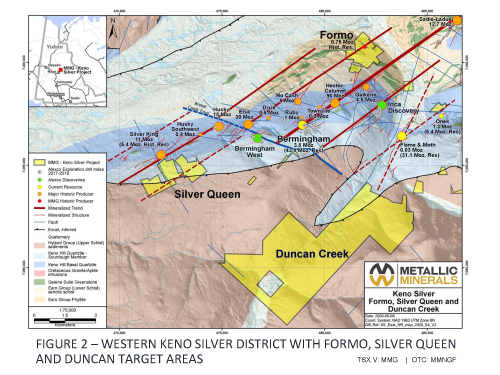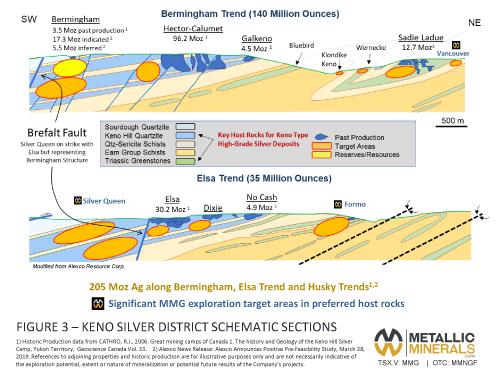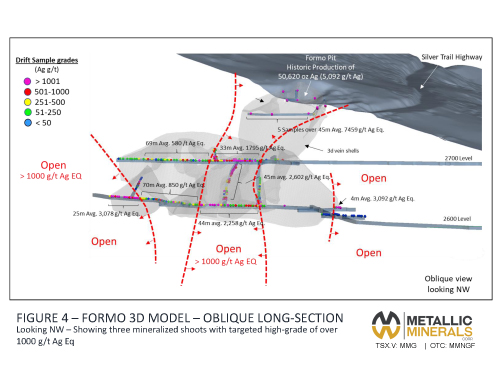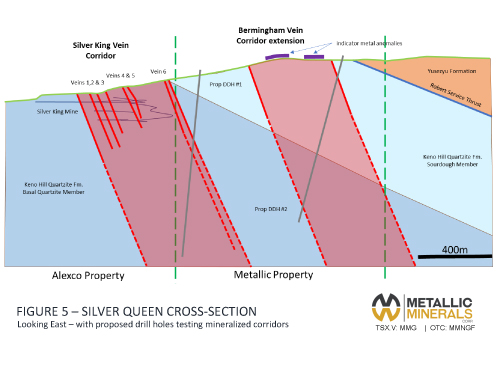May 26, 2020, Vancouver, B.C., Metallic Minerals Corp. (TSX-V: MMG; US OTC: MMNGF)(“Metallic Minerals”, “Metallic” or “The Company”) is pleased to report on exploration results and ongoing 3D modelling at the West Keno targets on its 100%-owned, 166 square kilometer Keno Silver project within the Yukon’s high-grade Keno Hill silver district. These results focus on Keno Hill style high-grade silver-lead-zinc mineralization at the Formo, Silver Queen and Duncan Creek priority target areas. Future news releases covering the Keno Silver project will report results from sampling and on-going modelling work on the Central and East Keno target areas, which host additional priority exploration targets, that along with Keno West will be the focus of the next phases of drilling.
Metallic Minerals’ Keno Silver property is the second largest land position in the historic Keno Hill silver district directly adjoining the operations of Alexco Resources. The Keno Hill silver district is one of the world’s highest-grade silver districts, with nearly 300 million ounces (“Moz”) of silver in past production and current M&I resources1,2, and excellent existing infrastructure, including grid power, road access and nearby community services.
Highlights from West Keno include:
- Underground channel samples from the Formo target area show three high-grade mineralized shoots grading more than 1,000 g/t silver equivalent (Ag Eq) grade that remain open to expansion (See figure below).
- Grades from the main Formo deposit returned an average of 7,459 g/t Ag Eq over 45 m lateral width on the 2800 level, 33 m lateral width grading 1,795 Ag Eq on the 2700 level and 44 m lateral width grading 2,258 Ag Eq on the 2600 level with mineralization open to expansion (see Table 1 below).
- Identification of two adjacent high-grade mineralized shoots in underground sampling at Formo on the 2600 level that are open to expansion laterally and to depth.
- Definition of two new untested surface target zones have also been identified along the main Formo structure.
- Refinement of two priority drill targets at the Silver Queen target area down dip of Alexco Resources’ high-grade Silver King deposit and trend extension of the Bermingham systems.
- Discovery of two new multi-kilometer soil anomalies at the early stage Duncan target area.
- Receipt of permits for drilling at Formo and Silver Queen in place with planning underway for the next phase of exploration activities.
Greg Johnson, President and CEO, stated: “Following our key acquisitions in the Keno Hill silver district in 2017 and 2018 we have continued to integrate the extensive historic exploration data covering the district along with our new geochemical and geophysical surveys in order to prioritize targets for step-out and first-stage drill testing following a systematic approach to exploration. Our objective, through the integration of surface sampling, mapping, modelling of drilling and geophysics, along with multi-spectral imagery, is to rapidly advance the most prospective targets to drill testing and the development of new mineral resources in this proven, brownfields district. The Formo and Silver Queen advanced stage target areas occur along known productive structural corridors that host some of the largest deposits in the district and have the potential to quickly advance to the resource stage with additional drilling. In addition, the work at the Duncan Creek target area has quickly developed a significant surface anomaly on trend with several important productive structures. Metallic Minerals is well funded to be able to complete the next major milestones on our strong portfolio of projects and we look forward to reporting on additional work from the Keno Silver project, as well as the pending results from our recent La Plata project field programs.”
Introduction to the Keno Hill silver district and West Keno targets
Within the prolific, high-grade Keno Hill silver district, the western 12 kilometers (“km”) of the 35 km wide district has seen the most intensive exploration and mining, including the major discoveries at the Bermingham and Flame & Moth silver deposits by Alexco Resources (“Alexco”). Recent reconnaissance drilling results from Alexco, announcing the discovery of the Inca deposit and the intercepted offset of the western extension of the Bermingham structural corridor, continue to demonstrate the remaining exploration potential in the district through a systematic exploration process along the productive mineralized trends (see Figure 1 link below).
Figure 1 - Keno Hill silver district geology and deposits
Metallic Minerals’ holdings directly adjoin Alexco’s operations and include 8 past producing deposits that were some of the highest-grade deposits in the district. These deposits had only very shallow surface mining mostly from the 1920s and 30s and represent excellent targets with modern exploration tools. The Company’s holdings in the western Keno Hill silver district occur along extensions of major structural corridors that host the Silver King, Elsa, and Hector-Calumet deposits, which are some of the largest silver producers in the district (see Figure 2 link below). The figure also highlights the recent discoveries by Alexco at Bermingham, the western Bermingham extension, Inca and Flame & Moth.
Figure 2 - West Keno Targets at the Keno Silver Project, showing the Formo, Silver Queen, and Duncan Creek target areas in relation to historic mines and new resources in the Keno Hill silver district
The largest deposits in the district are hosted primarily in the Keno Hill quartzite and Triassic greenstones along major structural corridors where the structural setting allows for the development of significant Keno Hill type high-grade silver-lead-zinc rich vein deposits. The schematic section shown on Figure 3 below, illustrates the major deposit locations along the Bermingham and Elsa trends, two of the most productive structural corridors. This figure also shows the similarity of the Silver Queen and Formo target areas to the stratigraphic and structural settings at the Bermingham and Sadie Ladue deposits.
Figure 3 - Schematic long section of the geology and deposits along the Bermingham and Elsa trends showing the Silver Queen and Formo targets
FormoTarget Area
The Formo advanced stage target area hosts the historic Formo mine, which produced silver at various times since the 1930s from high-grade vein structures that graded an average of 5,092 g/t silver1. The majority of this historic production came from an open pit adjacent to the Silver Trail highway between the Elsa townsite and Keno City. At Formo a total of 1.2 km of exploration drifting on three levels were developed with connected vertical raises that outline silver-lead-zinc mineralization down to a depth of approximately 100 m from surface. Historic drilling included six diamond core holes (1,988m) along with 54 percussion holes (2,647m) (see Figure 4 below).
Figure 4 - 3D model showing the high-grade Formo target composite channel sample grades from underground levels below the historic Formo surface mine
At least three vein structures, hosted primarily in greenstones below the main Keno Hill quartzite unit, have been identified at Formo in underground sampling, drilling and trenching. These structures are located two kilometres northeast of the historic Hector-Calumet mine, which was the largest silver producer in the district producing nearly 100 Moz of silver. The Formo deposit occurs along a splay of the Hector-Calumet structure where it intersects the Elsa structural trend, which was the second largest silver producer in the district (see Figures 1 and 2). The deposit setting for Formo is geologically similar to the greenstone hosted Sadie Ladue mine (12.7 Moz of silver at 1,781 g/t Ag) and Keno Hill mine (12.6 Moz of silver at a grade of 1,520 g/t Ag), two of the district’s highest grade deposits1 (see Figure 3 Long Section above).
Recent modelling of results at Formo by Metallic Minerals have integrated the surface, underground and drill related sampling into a 3D geologic model along with high-resolution orthophotography, multi-spectral studies and newly interpreted geophysical surveys covering the area. Figure 3 highlights the mineralized shoots at the Formo deposit in long section view. Between the open-pit surface exposures and the 2600 level drift, the vein has been delineated by channel sampling from underground drifts and drilling for approximately 100 meters vertically and 200 meters laterally. This modelling reveals at least three well-defined mineralized shoots of high-grade silver grading over 1,000 g/t silver. These mineralized shoots remain open to expansion at depth and along strike and extensions of these shoots will be the focus of future drilling (see Table 1 and Figure 4).
Sampling from the main mineralized shoot under the historic Formo open pit shows an average grade of 7,459 g/t Ag Eq over 45 m lateral width in 5 samples, on the 2800 level, 33 m lateral width grading 1,795 g/t Ag Eq on the 2700 level and 44 m lateral width grading 2,258 g/t Ag Eq on the 2600 level with mineralization open to expansion at depth (see Table 1 below).
Sampling on the 2600 level also shows two additional high-grade mineralized shoots along the southwest-northeast trend of the main mineralized structure. The first zone includes 25 m lateral width averaging 3,078 g/t Ag Eq. ending in mineralization and open to the southeast and to depth. Adjacent to this are two zones of mineralization of 69 m grading 580 g/t Ag Eq. and 70 m 850 g/t Ag Eq on the 2700 and 2600 levels connecting to the main central shoot. A second 4 m wide zone ending in high-grade mineralization on the 2600 level averages 3,092 g/t Ag Eq. and is also open to expansion laterally to the northeast and to depth.
Table 1: Significantresults from Formo underground drift-length composite channel samples
| Level | Drift Length (m) | Sample Count | Average Channel Sample Width (m) | Ag Eq g/t | Ag g/t | Pb % | Zn % | Au g/t |
|---|---|---|---|---|---|---|---|---|
2600 | 25 | 16 | 0.66 | 3,078 | 1,404 | 18.5 | 27.5 | - |
2600 | 70 | 45 | 0.53 | 850 | 231 | 8.0 | 14.6 | - |
2600 | 44 | 28 | 1.14 | 2,258 | 813 | 20.7 | 17.4 | 0.09 |
2600 | 4 | 4 | 0.99 | 3,092 | 2,335 | 1.5 | 1.6 | - |
26-27 Raise | 45 | 43 | 0.71 | 2,602 | 1,233 | 11.9 | 15.6 | - |
2700 | 69 | 42 | 0.77 | 580 | 254 | 3.1 | 4.1 | 0.10 |
2700 | 33 | 32 | 0.62 | 1,795 | 1,289 | 3.4 | 5.1 | 0.41 |
2800 | 45 | 5 | 0.58 | 7,459 | 5,077 | 10.6 | 17.5 | - |
Silver equivalent (Ag Eq) values assume Ag $16/oz, Pb $1.10/lb, Zn $1.25/lb, Au $1,250/oz and 100% recovery. Average channel sample widths based on calculated true widths.
In addition to the mineralization at the main Formo deposit two new surface targets have been identified along the same structural corridor within parallel greenstone sills. Additional 3D modelling is underway on these newly identified targets. The opportunity to significantly expand the known mineralization at Formo defined from underground sampling and drilling to date, as well as the potential to define new high-grade mineralized shoots along the main mineralized structural corridor, makes this one of the top priority advanced stage targets on the Keno Silver project.
The previously pending Class 3 permit covering the Formo claims has been granted and the Formo target is prioritized for drilling during the next phases of work on the property.
Silver Queen Target
The Silver Queen target area is located at the western end of the Keno Hill silver district adjacent to Alexco's Silver King mine, which produced 11 million ounces of silver at an average grade of 1,800 g/t1 in the 1920s and 30s (See Figure 2 Map and Figure 3 Long Section). Production at Silver King came from both underground and open pit mine sources hosted in Keno Hill quartzite. Six mineralized vein structures have been identified that host a historic resource of 5.3 million ounces of silver at an average grade of 1,373 Ag g/t2.
Modelling at the Silver Queen target area by Metallic Minerals has refined two priority targets for drill testing that include the potential projected down dip extension of the high-grade Silver King deposit and the trend extension of the western Bermingham system. Both structural corridors represent significant near-term exploration targets at Silver Queen (See Figure 5 Silver Queen Cross Section).
Figure 5 - A cross section through the Silver Queen target showing major mineralized structural corridors and targets
Recent nearby reconnaissance drilling by Alexco in 2018 and 2019 successfully discovered the western Bermingham extension, intercepting multiple high-grade Keno Hill type vein structures across what is believed to be the offset of the main Bermingham structural corridor by the Brefault structure3. The Bermingham deposit includes 33 million ounces of measured and indicated silver along with 11 million ounces of inferred resources that are hosted in the Keno Hill quartzite and that remain open at depth and along trend to the southwest, making it the second largest deposit in the district2. The Figure 2 plan map shows the western offset Bermingham system drilling and its potential strike onto the Silver Queen target area.
Work by Metallic Minerals at Silver Queen has included the completion of soil sampling, detailed surface magnetic and VLF geophysics, reprocessing and interpretation of regional geophysics, and 3D modelling. The geophysical surveys indicate a 400m wide resistive body of potential quartzite and grit dominant lithology that is overlain by anomalous soil geochemistry that may indicate the presence of the projected structural corridor. New processing and interpretation of regional geophysics shows a spatial relationship between deep structural features at Keno Hill and some of the largest deposits in the district with a similar pattern seen at Silver Queen.
A class 3 permit covers Silver Queen and this drill ready target is highly prospective to host extensions of the high-grade silver mineralization seen at Silver King and Bermingham.
Duncan Creek Target
The early stage Duncan Creek target area covers the southwestern extensions of several major mineralized trends including the Flame & Moth and several parallel structural corridors and is located 8 km by road from Keno City. Duncan Creek was one of the first areas that attracted prospectors to the area in 1898 with an estimated 40,000 ounces of placer gold production and two placer operations that are still active along the creek and its tributaries.
Work by Metallic Minerals at this new early stage target area has led to the discovery of two new multi-kilometer soil anomalies on trend with projected structural corridors. The Company plans to complete additional surface sampling and mapping along with a detailed magnetic and VLF geophysical survey to refine targets at the Duncan Creek target area in preparation for potential reconnaissance drilling in the next stage of evaluation.
District Summary
Exploration by Metallic Minerals continues to systematically build on the Company’s 3D geologic database covering the east, central and western portions of the Keno Hill silver district with a total of 81 drill holes completed on the Keno Silver project to date. Exploration by the Company has advanced three targets in the central and western parts of the district to step-out drilling stage and several additional targets to drill-ready status along the known historically productive trends that are on strike with past-producing mines. In addition, recent exploration has refined and expanded 10 new priority multi-kilometer-scale early-stage targets for reconnaissance drilling in the under-explored eastern part of the district along where highly elevated silver, lead and zinc in soils and high-grade rock samples have been identified.
Metallic Minerals will be reporting additional results from its expanded East Keno sampling programs and geophysical survey interpretation in coming weeks. Planning is underway for the next phase of exploration in 2020 and the Company is well funded to advance the Keno Silver project to the next major milestones at both its advanced stage and early stage targets.
Footnote References
1Cathro, R. J. (Bob). Great Mining Camps of Canada 1. The History and Geology of the Keno Hill Silver Camp, Yukon Territory. Geoscience Canada, [S.l.], Sept. 2006. ISSN 1911-4850
2Alexco Resource Corp NI 43-101 Technical Report entitled “Prefeasibility Study of the Keno Hill Silver District Project, Yukon, Canada” dated February 13, 2020
3Alexco Resource Corp news release dated January 21, 2019, entitled “Alexco 2018 reconnaissance drilling confirms continuation of Bermingham mineralization at depth and identifies an offset extension, identifies gold targets”
References to adjoining properties are for illustrative purposes only and are not necessarily indicative of the exploration potential, extent or nature of mineralization or potential future results of the Company’s projects
About Metallic Minerals
Metallic Minerals Corp. is a growth stage exploration company, focused on high-grade silver and gold in underexplored brownfields mining districts. Our objective is to create shareholder value through a systematic, entrepreneurial approach to exploration in the Keno Hill silver district, La Plata silver-gold-copper district, and Klondike gold district through new discoveries and advancing resources to development. All three districts have seen significant mineral production and have existing infrastructure, including power and road access. Metallic Minerals is led by a team with a track record of discovery and exploration success on several major precious and base metal deposits, as well as having large-scale development, permitting and project financing expertise.
About the Metallic Group of Companies
The Metallic Group is a collaboration of leading precious and base metals exploration companies, with a portfolio of large, brownfields assets in established mining districts adjacent to some of the industry’s highest-grade producers of silver and gold, platinum and palladium, and copper. Member companies include Metallic Minerals in the Yukon’s high-grade Keno Hill silver district and La Plata silver-gold-copper district of Colorado, Group Ten Metals in the Stillwater PGM-nickel-copper district of Montana, and Granite Creek Copper in the Yukon’s Minto copper district. The founders and team members of the Metallic Group include highly successful explorationists formerly with some of the industry’s leading explorer/developers and major producers. With this expertise, the companies are undertaking a systematic approach to exploration using new models and technologies to facilitate discoveries in these proven, but under-explored, mining districts. The Metallic Group is headquartered in Vancouver, BC, Canada and its member companies are listed on the Toronto Venture, US OTC, and Frankfurt stock exchanges.
FOR FURTHER INFORMATION, PLEASE CONTACT:
Website: www.metallic-minerals.com Phone: 604-629-7800
Email: chris.ackerman@metallic-minerals.com Toll Free: 1-888-570-4420
Quality Assurance / Quality Control
All samples were assayed by 36 Element Aqua Regia Digestion ICP-MS methods at Bureau Veritas labs in Vancouver. Analytical work in 2017 was done by Bureau Veritas Commodities Canada Ltd. with sample preparation in Whitehorse, Yukon and geochemical analysis in Vancouver, British Columbia. Each rock (grab) sample was analyzed for 36 elements using an Aqua Regia digestion with inductively coupled plasma-atomic emission spectroscopy (ICP-AES) and inductively coupled Plasma-mass spectrometry (ICP-MS) (AQ202). Samples with over limit silver and gold were re-analyzed using a 30-gram fire assay fusion with a gravimetric finish (FA530-Ag, Au). Over-limit lead and zinc samples were analyzed by multi-acid digestion and atomic absorption spectrometry (MA404) or titration (GC516, GC8917). All results have passed the QAQC screening by the lab.
Qualified Person
Scott Petsel, P.Geo, Vice President, Exploration and an employee of Metallic Minerals Corp., is a Qualified Person as defined by National Instrument 43-101. Mr. Petsel has reviewed the scientific and technical information in this news release and approves the disclosure contained herein. Mr. Petsel has reviewed the results of the sampling program and confirmed that all procedures, protocols and methodologies used in the drill program conform to industry standards.
Forward-Looking Statements
Forward Looking Statements: This news release includes certain statements that may be deemed "forward-looking statements". All statements in this release, other than statements of historical facts including, without limitation, statements regarding potential mineralization, historic production, estimation of mineral resources, the realization of mineral resource estimates, interpretation of prior exploration and potential exploration results, the timing and success of exploration activities generally, the timing and results of future resource estimates, permitting time lines, metal prices and currency exchange rates, availability of capital, government regulation of exploration operations, environmental risks, reclamation, title, and future plans and objectives of the company are forward-looking statements that involve various risks and uncertainties. Although Metallic Minerals believes the expectations expressed in such forward-looking statements are based on reasonable assumptions, such statements are not guarantees of future performance and actual results or developments may differ materially from those in the forward-looking statements. Forward-looking statements are based on a number of material factors and assumptions. Factors that could cause actual results to differ materially from those in forward-looking statements include failure to obtain necessary approvals, unsuccessful exploration results, changes in project parameters as plans continue to be refined, results of future resource estimates, future metal prices, availability of capital and financing on acceptable terms, general economic, market or business conditions, risks associated with regulatory changes, defects in title, availability of personnel, materials and equipment on a timely basis, accidents or equipment breakdowns, uninsured risks, delays in receiving government approvals, unanticipated environmental impacts on operations and costs to remedy same, and other exploration or other risks detailed herein and from time to time in the filings made by the companies with securities regulators. Readers are cautioned that mineral resources that are not mineral reserves do not have demonstrated economic viability. Mineral exploration and development of mines is an inherently risky business. Accordingly, the actual events may differ materially from those projected in the forward-looking statements. For more information on Metallic Minerals and the risks and challenges of their businesses, investors should review their annual filings that are available at www.sedar.com.
Neither the TSX Venture Exchange nor its Regulation Services Provider (as that term is defined in the policies of the TSX Venture Exchange) accepts responsibility for the adequacy or accuracy of this release.






